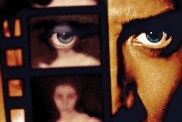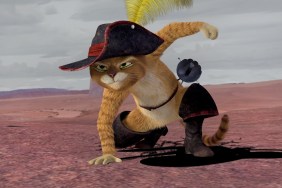Koji Yakusho as Michio Hayasaki
Hiromi Nagasaku as Nagai Yuka
Yusuke Santamaria as Kimishima
Masahiro Toda as Aoki
Hitomi Sato as Takano
Special Features:
Theatrical Trailer
“Making of” Featurette
Interview with Director Kiyoshi Kurosawa
Synopsis:
Michio Hayasaki (Koji Yakusho) is an inventor building an “artificial body”, but his research budget being cut is the least of his problems, as he is being stalked by a guy who looks exactly like him–his doppelganger! This evil twin starts doing all of the things that he would never do himself, ultimately helping him to achieve his goals, but there may be darker intentions at work here.
Analysis:
The concept of having an evil twin or a dark side is nothing new. Stephen King has written far too many stories using that concept like “The Dark Half” and “Secret Window, Secret Garden.” The concept is interesting in the sense that it makes the perfect excuse for anyone who does something they may regret later, but it seems too bland to be used as source material for a modern horror film. Japanese horror director Kiyoshi Kurosawa (Pulse) tries to put a different twist on this premise by building on the idea that if you see your doppelganger, you will probably die shortly. As daunting as that may sound, what Kurosawa comes up with is far from the horror thriller one might expect.
Doppelganger starts out with a case of mistaken identity as a young woman named Yuka thinks she sees her brother at a store. When she gets home, he’s waiting there for her, and when she gets a call in the middle of the night that his body has turned up dead of a suicide, she can’t figure out why he’s actually in the next room typing away.
From this creepy introduction, we’re introduced to Hayasaki and the troubles he’s been having finishing his latest invention-a chair with mechanical arms-due to his unsupportive boss. He has a conversation with Yuka about her strange encounter with her brother’s doppelganger, although she confesses that she likes him better, since he’s less of a slacker. During this conversation, she also warns Hayasaki that if he should happen to see his doppelganger, that he would likely die shortly afterwards.
When Hayasaki runs into his own twin, as would be expected, he’s deeply frightened, but then, his twin starts turning up everywhere he goes, becoming more of a nuisance, except for the fact that he’ll do all of the things that Hayasaki would never do himself. This includes trashing his boss’ office, stealing his own invention from the company, and even humiliating and making a pass at his female assistant. When the doppelganger starts murdering people to help Hayasaki, it’s obvious that this situation isn’t working out, and Hayasaki realizes only one of them can live.
The blurb that Doppelganger is Kurosawa’s “most frightening film yet” is a bit of a misnomer, since it’s not even remotely scary. I’m not even sure if you could consider this a horror movie, let alone a thriller, as it’s more of a dark comedy that tries to explore what might happen if someone were to actually encounter their twin. Although it tries to take the intelligent approach, it’s really hard not to be reminded of Michael Keaton’s Multiplicity, which built its entire premise on having multiple Keatons walking around talking to themselves.
The methods used to show actor Koji Yakusho playing two separate people are fairly primitive often using split screen trickery to allow him to talk to himself. As the movie progresses, more digital computer tricks are used to combine the two Hayasakis, but the split screen stuff seems more like a low-budget cheat, which makes it look like a Brian DePalma film. There are certainly some clever visual tricks throughout, but after awhile, you’re never sure which one of them you’re watching, which may have been the point.
Beyond that, it’s not particularly well written or directed, almost as if Kurosawa came up with this premise but never really thought out very much of what to do with it. Mostly, it’s a fairly slow dialogue-driven movie with Hayasaki talking to himself a lot or corroborating with Yuka about their doppelganger woes. There’s never any explanation of why these doppelganger just showed up, whether it be supernatural or just a coincidence, but Hayasaki suddenly has a guy who looks just like him walking around and causing trouble. It’s obviously not a hallucination, which would have been a huge cop-out , but everyone around him can see his other self, readily accepting him to be his twin brother. Oddly, Hayasaki seems more concerned with his peculiar invention than figuring out how to deal with this mysterious doppelganger.
Regular Kurosawa collaborator Koji Yakusho is the movie’s one saving grace, giving an impressive performance as the inventor and his double. Watching the two very different personalities interact with each other makes his scenes as fun to watch as Nicholas Cage’s dual role in Adaptation. His performance helps the character and premise grow on you, even as the camera trickery starts to get old. Most of the other characters are rather pointless. Yuka is introduced to set-up the story, but then she becomes an integral part of Hayasaki’s story, and then there’s the dim-witted assistant, who seems to be throwaway comic relief until he plots to steal Hayasaki’s invention.
And that’s where it all goes wrong. Even once you have gotten past the fact that this isn’t a horror film, the climax and resolution of the story is such a huge let-down, turning into a cross-country chase between Hayasaki and his assistant, who has stolen the “Artificial Body.” Why anyone would want this thing is beyond me. It looks like a bulky wheelchair with mechanical arms, making it the cheesiest film robot since the ’80s comedy Short Circuit! This chase leads to a bunch of senseless violence–one killing so random and puzzling that you wonder why they even bothered-and at one point-I kid you not here-Hayasaki’s assistant is chased down the stairs by what looks like a giant disco ball a bit like the opening scene in Raiders of the Lost Ark. Basically, Kurosawa’s rather silly and unoriginal premise is ignored and forgotten in favor of the even more ludicrous subplot. Anyone expecting a horror film would have probably stopped the DVD a long time ago.
The Extras:
Trailer – Watching the trailer before and after seeing the movie is an interesting experience, because it shows that this may be one of the most deceiving trailers ever. Using quick editing and eerie music, it makes the movie look like the scariest movie ever made, rather than a boring dark comedy.
The Making of Doppelganger – This is mostly a typical generic featurette with clips narrated by a voice-over, which gives away the entire plot of the movie (which we already know) and on-set scenes of the film being shot. The most interesting part of the film, how they got Yakusho to act opposite himself, is briefly explained with one scene broken down into its composite elements. Other than that, all the preparation you see for the costumes, location scouting, etc. never quite explains why the resulting movie turned out so bad. (Maybe because they didn’t spend enough time working on the actual script?) One learns even less from the terrible interviews with the cast. Yakusho gives the revelation that it was hard playing two roles. No kidding. He comes across like a Mensa member compared to his rookie co-star Hiromi Nagasaku, who reverts to a giggling schoolgirl. Their stock answers offer no new revelations, and this poorly conceived 19-minute piece is not nearly as effective once one has actually seen the movie.
Interview – Maybe we can learn what happened from the director himself? Actually, we can. Kurosawa explains why he wanted to break away from the horror genre, and do something more like a comedy with physical humor. Aha! This revelation makes a lot more sense, pointing to the improper marketing of the film as the reason why it ultimately doesn’t work as a horror film. Kurosawa come across intelligently in this interview, even if some of the decisions he made while making the movie were a bit strange. (He even talks about how the disco ball came about.)
The Bottom Line:
Doppelganger fails to deliver on the scares one would expect from its marketing, and though the idea of having a doppelganger is promising, it’s squandered in favor of a dark comedy involving the stealing of an invention. As intelligent as this tries to come off, it fails miserably. At least, this is one Japanese movie you probably won’t be seeing remade in English anytime soon.










